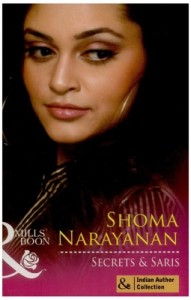After reading The One She Was Warned About I wanted to check out another book by Narayanan. Secrets & Saris surprised me by being having some fairly controversial content. Shefali Khanna is a recently jilted bride overseeing a child care center in a new town. Neil Mitra is a television personality with too much baggage to start a new relationship. This is a conventional start for Harlequin so I wasn't prepared for where the story went. Narayanan bit off more than the page length allowed her to fully chew. The relationship between Shefali and Neil felt as though I were watching them through a zoetrope, their conflicts circling back as quickly as they'd cleared.
Shefali is a very traditional woman. She was prepared for an arranged (but not hasty) marriage when her fiancé leaves her at the altar. Never having planned for a life beyond wife and mother, she breaks with her family to explore what she wants from life. Shefali is confident, capable and engaging. She also ends up with a HEA despite her best efforts. Shefali spends way too much time telling Neil what he thinks, feels or wants and far too little time protecting herself. She repeatedly agrees to things she knows will make her unhappy. Passive aggressive might be her middle name.
For his part, Neil is an enigma. His heritage is brushed over as irrelevant, except for two odd scenes. The first, an obvious plot device, involves him not being expected to understand Bengali. The second has Shefali ruminating that Neil's mother appears more culturally conservative than her own. This was a point I would have liked to explore. Neil's family was less traditional than Shefali's, so why did she interpret Neil's mother that way? Was it only her clothing, or was it in the fetish/appropriation sense? In a way Neil serves the same role the half-Indian hero does in most of his appearances. His heritage makes him mildly exotic without informing much of his personality or the plot. Unlike most, Neil is culturally identified as Indian, not English.
The major conflict between Shefali and Neil involves abortion. I suppose you could say it's Shefali's uncertainty about Neil's commitment or their inability to fully express their feelings. I'd disagree. Neil's hangups are tied directly to children, as are Shefali's. She's ready to start a family and he is not. Shefali decides to marry Neil with the hope of changing his mind over time. (Oh honey, no.) In the end I admired Secrets & Saris more than I enjoyed it. While I liked the ambition, at the book's close too much was swept aside.
Spoiler Zone: Neil has a child from prior relationship. He pressured his former partner into having the child instead of terminating the pregnancy. Shefali is surprised he is raising his daughter alone, apparently expecting Neil to have then asked a female relative to raise her. Although a devoted father, Neil decides not to have more children. Narayanan lightly touches on how Neil feels entitled to dictate how both women use their wombs but shies away from the point by book's end.
*This review originally appeared at Love In The Margins.



